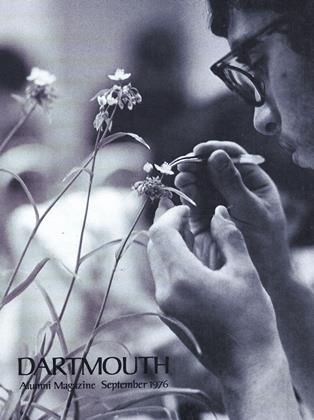He is so paradoxical as to seem simple. A cosmopolitan, he is most at home in Maine. A genial entertainer, the friend of almost every poet of distinction in this country and abroad, he is a loner. Born April 5, 1904, now in his 70s, he is still Dick Eberhart, an undergraduate of the 19205. His beard, now shaved off, confused no one because it could not alter the artless smile and the rosy cheeks of an adolescent and the innocent eyes. Born in Minn'esota, devoted to his Betty, he cavorts poetically in Fields of Grace, with Eleanor in Aquitaine or with barefoot young girls, "sweet Helens of Africa, immortal, tall, stately, and naked" in Kenya.
Once Consultant in Poetry at the Library of Congress, Richard Eberhart, majestic and humble, now rises before us in his urban complexity and Cape Rosier (Maine) bucolic simplicity. With his Bermuda shorts dangling gracelessly below his knees, his long-brimmed fishing cap, and his sockless tennis shoes, he seems to belie his reputation as the vital and vivacious American poet who has won all major prizes: Pulitzer, Bollingen, Shelley, and Harriet Monroe. After 20 years as poet-resident at Dartmouth, he is still Dick, neither academic nor poetic, neither Harvard Kittredge nor Oxford Shelley. All his life he has sought wisdom. What does he know now? Neither cheerful nor depressed, he confesses, "Nothing more than when I was 16." To aspiring poets in advanced seminars he offers expert advice about content, technique, and style, but when he writes a poem it is always profound, never shallow; beautiful, never misshaped; skillful, never inept.
This new volume collects "the best and most loved work" of Eberhart's career of almost a half century. The first poem asserts that what "fevers" him is "sun on green/ On grass glowing, this young spring." The second poem leads off with "O wild Chaos! O sweet Chaos!/ Dance to my arms, I would lie with you." In the penultimate he must not lie dreaming, like a boy on the face of the earth, but stand up to time and nature. In the final poem he "should be more bland, more austere." The range between is considerable: Chinese paper snakes, burr oaks, aerial bombardments, Indian pipes (a flower), God and the gods of Washington, D. C., Oedipus, viable women, dry rot, a squirrel crossing a New England road in autumn, an old fashioned businessman, and an Egyptian mummy in Berlin.
Style, Eberhart observes, is the perfection of a point of view, "nowise absolute, but held in a balance of opposites." He writes so spontaneously and confidently that he can produce a dozen poems in 36 hours. Stimulated by his tobacco pipe, he studies changing smoke patterns. Then his typewriter, battered and antique, clicks out still another poem.
COLLECTED POEMS 1930-1976By Richard Eberhart '26Oxford, 1976. 364 pp. $13.95
John Hurd, reviews editor emeritus, returns tofamiliar haunts.
 View Full Issue
View Full Issue
More From This Issue
-
 Feature
FeatureSeeing Farther than the Green
September 1976 By BLISS K. THORNE and NANCY DECATO -
 Feature
FeatureSteady State
September 1976 By Pierre Kirch -
 Feature
FeatureHarvard Myths About Dartmouth
September 1976 By ERICH SEGAL -
 Feature
FeatureHANOVER SUMMER
September 1976 -
 Books
BooksNotes on a common bond: the federal city, that summer in Philadelphia, Essex County in revolt, and disaster in Ohio
September 1976 By R.H.R. -
 Article
ArticleMeasured Quantities
September 1976
JOHN HURD'21
-
 Class Notes
Class Notes1921
April 1976 By HAROLD F. BRAMAN, G. HARRY CHAMBERLAINE, JOHN HURD'21 -
 Books
BooksFIRST PERSON: CONVERSATIONS ON WRITERS AND WRITING WITH GLENWAY WESCOTT, JOHN DOS PASSOS, ROBERT PENN WARREN. JOHN UPDIKE. JOHN BARTH, ROBERT COOVER
March 1974 By JOHN HURD'21 -
 Books
BooksMASTER OF THE COURTS.
May 1974 By JOHN HURD'21 -
 Books
BooksALFRED LORD TENNYSON: IN MEMORIAM. AN AUTHORITATIVE TEXT, BACKGROUND AND SOURCES, CRITICISM.
May 1974 By JOHN HURD'21 -
 Books
BooksThe Eye of the Beholder, Squinting
April 1975 By JOHN HURD'21 -
 Books
BooksMetals and Living Flesh
March 1976 By JOHN HURD'21
Books
-
 Books
BooksFaculty Publications
February 1934 -
 Books
BooksAlumni Notes
March 1947 -
 Books
BooksALL THE BEST IN HOLLAND
November 1950 By Herbert F. West '22 -
 Books
BooksANALYTIC GEOMETRY,
May 1949 By L. L. Silverman -
 Books
BooksTHE BRITISH IN NORTHERN NIGERIA.
JANUARY 1970 By LEO SPITZER -
 Books
BooksDartmouth Authors
OCTOBER 1985 By Mark Woodward '72
JOHN HURD'21
-
 Class Notes
Class Notes1921
April 1976 By HAROLD F. BRAMAN, G. HARRY CHAMBERLAINE, JOHN HURD'21 -
 Books
BooksFIRST PERSON: CONVERSATIONS ON WRITERS AND WRITING WITH GLENWAY WESCOTT, JOHN DOS PASSOS, ROBERT PENN WARREN. JOHN UPDIKE. JOHN BARTH, ROBERT COOVER
March 1974 By JOHN HURD'21 -
 Books
BooksMASTER OF THE COURTS.
May 1974 By JOHN HURD'21


